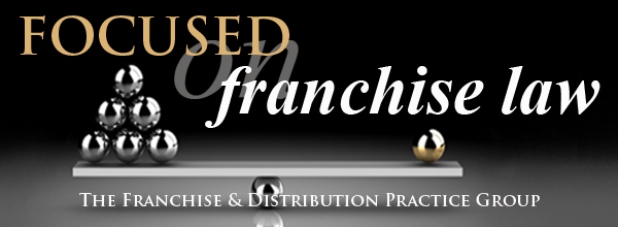Franchise Systems Can Fight Online Negativity; Bankruptcy Discharges Franchise Law Claims

bkurtz@lewitthackman.com
tgrinblat@lewitthackman.com
msoroky@lewitthackman.com
kwallman@lewitthackman.com
September 2015
ABA Forum: David Gurnick Presenting
David Gurnick will co-present: Finders, Keepers, Losers, Weepers: Opportunities, Risks & Considerations in Using Intellectual Property Created by Others, at the ABA’s 38th Annual Forum on Franchising, held in New Orleans October 13-17th. Finders, Keepers is scheduled for 10:15 a.m. on Thursday, 10/15, and 11:15 a.m. on Friday, 10/16.
*Certified Specialist in Franchise & Distribution Law, per the State Bar of California Board of Legal Specialization
FRANCHISOR 101:
Franchise Systems Can Fight Online Negativity

 One of today’s challenges faced by franchisors and franchise systems is negative remarks posted online by a customer, ex-employee, or even a dissatisfied franchisee. Negative comments appear in sites created specifically to criticize; on social media like Facebook or Tweets, blogs, personal sites and review sites like Yelp. These posts can reach unlimited numbers of people and hurt a brand’s reputation.
One of today’s challenges faced by franchisors and franchise systems is negative remarks posted online by a customer, ex-employee, or even a dissatisfied franchisee. Negative comments appear in sites created specifically to criticize; on social media like Facebook or Tweets, blogs, personal sites and review sites like Yelp. These posts can reach unlimited numbers of people and hurt a brand’s reputation.
Posts, positive or negative, may have First Amendment protection. Website hosts have immunity under the federal Communications Decency Act, for content posted by others on their sites. But companies are learning of ways to fight back. Here are some choices from which franchisors can assemble a strategy against negative online comments.
Proactive Efforts: A proactive way to reduce negative comments is using care to provide quality products, good customer experience and treating franchisees and employees well. Satisfied people are less likely to complain. Dissatisfied people – more likely. As a timely example, consider Volkswagen. Apparently, dishonesty was built into VW’s products, and the company’s misguided intent to fool the public is generating massive online negative comments that will be around for years to come. Honesty and good product quality would have avoided most of that negativity.
Terms and Conditions: Another proactive step is to have terms with customers, suppliers, franchisees and others, limiting posting of negative online comments
Seek Removal: A franchisor could consider contacting and asking the poster to remove or modify their statement. This course is especially useful if the negative comment is due to a misunderstanding or unique circumstance that is not likely to recur. An explanation to a franchisee, a franchisee’s customer or ex-employee could address their concern. Sometimes an apology or other consideration may be needed. Some improper posts can be removed according to a site’s terms of use. Many sites have terms for objecting and asking that posts be removed. For a particularly egregious or unlawful posting, a franchisor may find it useful to go beyond the site’s stated procedure, and contact their management or attorney to request that the content be removed.
Post a Polite Response: Many sites provide the opportunity to post a reply. A respectful, even-tempered response explaining the circumstance, expressing regret for a poster’s experience, and if appropriate noting what corrective action was or will be taken, can partially mitigate some ill effects of a negative online comment.
Cease and Desist Demand: Where justified, such as for comments that are false, exaggerated, or defamatory, a franchisor may choose to have counsel send the poster a strong demand to cease, desist and remove the posting. If the poster has made a threat, or disclosed secret information, civil or criminal implications may arise. Sometimes, people who post comments want this kind of attention, prompting concern that a cease and desist demand will not dissuade their conduct, but will generate more undesired comments.
Prudent Inaction: Because responses to negative online comments may generate more comments and undesired attention, another rational strategy – in the right circumstances – is to take no action. For example, a comment on an active Facebook or other page, whether negative or positive, if not responded to, may receive less attention and be pushed down by later posts on other subjects.
Get Other Posts: Similar to the above is to enlist other customers, friends and associates to post their own truthful, favorable comments. This method provides positive messages and sometimes causes negative reviews to be pushed down, where they get less and eventually no attention.
Digital Millennium Copyright Act Take Down Notice: Where a post includes content that infringes a copyright, federal law has a procedure for notifying and requiring the website to remove that content.
Seek Government Help: In some circumstances it is useful to ask for help from the government. The FTC, Attorney General and elected representatives are possible sources of assistance. For example, when a person posting negative or false comments is really a competitor, or ex-employee now working for a competitor, such agencies and officials may be willing to help.
Litigation: Due to expense, litigation is rarely anyone’s first choice. But when someone breaks the law and won’t stop, our system provides courts as forums for seeking relief. Courts can help identify anonymous perpetrators and award money damages for defamation, disparagement, false advertising and sometimes injunctive relief.
Sign-Up: It is distasteful but sometimes balancing cost and effect, a practical solution is to sign up with sites where this is known to result in removing or lowering the prominence of negative comments.
Many tools and strategies exist for responding and fighting back. It is not necessary to just accept the injury, harm to reputation and loss of business that come with being a target of negative comments on the internet.
FRANCHISEE 101:
Bankruptcy Discharges Franchise Law Claims

A recent Bankruptcy Appellate Panel decision is a reminder of both a benefit of bankruptcy, in appropriate circumstances, and the need to respect the bankruptcy discharge a party obtains in the process.
Mr. Lee was developing a sushi restaurant concept called Little Madfish. Mr. Im and his wife invested $200,000 and obtained stock and rights to open a Little Madfish restaurant. They also applied for a visa to work in the U.S. on the basis of having made a substantial investment in the business.
The restaurant failed. Lee filed for bankruptcy. After he obtained a discharge, Mr. Im sued in state court for franchise law violations, fraud and rescission of the stock purchase. Lee moved in state court to dismiss the claims based on his bankruptcy discharge. The state court dismissed some claims, but not all of them. At trial, a jury found Mr. Lee did not commit fraud and the court ruled that another claim was barred by the bankruptcy discharge.
Lee then asked the bankruptcy court to reopen his case so he could seek sanctions against Im for violating the discharge in bringing the state litigation. The bankruptcy court held Mr. Im in contempt, holding him liable for $50,000, for suing in state court after Mr. Lee obtained a discharge.
A bankruptcy discharge protects against claims for violating franchise laws as well as other claims. (Though under one bankruptcy code exception, a discharge may not protect against securities law claims). A person who is sued for franchise law violations or most other claims, may be able to discharge them through bankruptcy and it is important for claimants to respect the bankruptcy discharge.
Read the entire decision: In re Lee 2015 WL 3960897 (9th Cir. Bankr. App. Panel)
